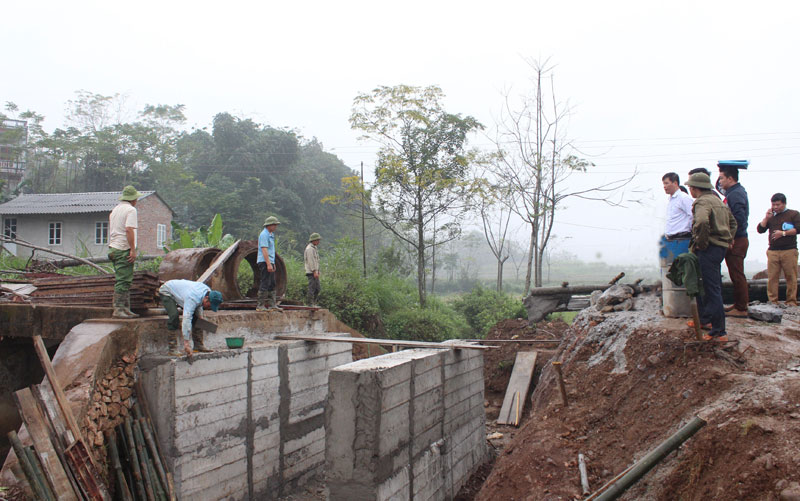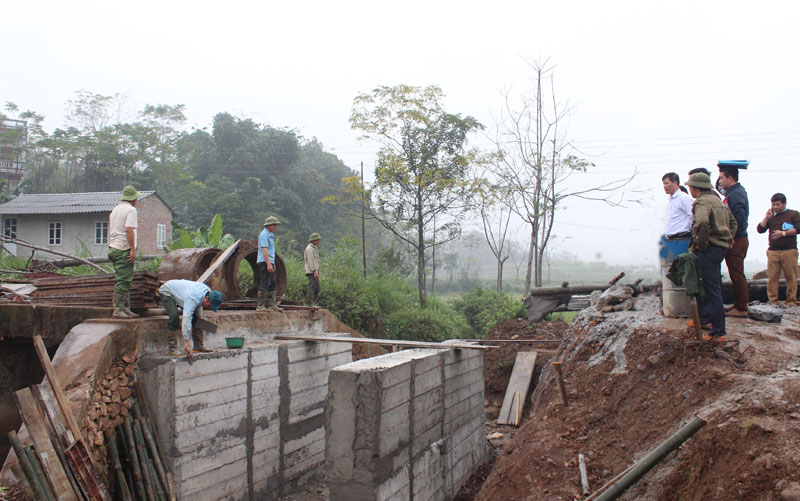
(HBO) – The provincial People’s Committee on January 22, 2019 issued Directive No.03/CT-UBND on stepping up efforts in natural disaster prevention and search and rescue work, with one of the key and urgent tasks being ensuring safety for local irrigational works and dyke system during the flood season in 2019.
For localities having reservoirs and dykes, the
provincial People’s Committee instructs them to take the initiative in
conducting inspection and evaluation of the safety level of the works, build
rational plan for water storage or restrict water storage in reservoirs in poor
conditions. Besides, they should have plans ready to ensure safety for
downstream residential areas and infrastructure, and strengthen the management
boards of irrigational works in order to guarantee the works are operated
safely before, during and after the flood season.
 Upgrade and repair are being made for
road and underground work in Que Kho hamlet, Kim Boi district’s Tu Son commune
to ensure safety before flood season.
Upgrade and repair are being made for
road and underground work in Que Kho hamlet, Kim Boi district’s Tu Son commune
to ensure safety before flood season.
Head of the provincial water resources bureau Tran Quoc Toan said that the
Department of Agriculture and Rural Development has directed its member units
to join hands with localities and competent agencies to carry out the Directive
No.03/CT-UBND. From the beginning of April, the department has organised
several working teams to supervise and speed up natural disaster prevention work
at districts, towns and irrigation works management companies. He described it
as the main task at present to reduce damage caused by natural calamities.
During 2017-2018, complicated weather conditions resulted in heavy losses in
both human lives and assets. According to the National Centre for
Hydro-Meteorological Forecasting, this year floods are forecast to come later
than normal; however, localities should stand ready to respond to dangerous
weather conditions like thunderstorm, hailstone and whirlwind.
The centre said that between 10-12 storms and tropical low pressure are
expected to appear in the East Sea during the storm season this year, with around
four to five storms likely to affect the mainland./.
According to data from the Hoa Binh Provincial Party Committee, the industrial production index for the first six months of 2025 is estimated to have increased by 20% compared to the same period last year. This marks the highest year-on-year growth rate for this period since 2020.
In the first six months of 2025, Hoa Binh province’s export turnover was estimated at 1.145 billion USD, marking an 18.11% increase compared to the same period in 2024. Import turnover was estimated at $ 804 million, a 17.15% increase, which helped the province maintain a positive trade balance.
The lives of the ethnic minority farmers in Tan Lac district have gradually improved thanks to the new directions in agricultural production. This is a testament to the collective strength fostered through the professional associations and groups implemented by various levels of the district’s Farmers’ Union.
With the motto the "product quality comes first,” after nearly one year of establishment and operation, Muong village’s Clean Food Agricultural and Commercial Cooperative, located in Cau Hamlet, Hung Son Commune (Kim Boi district), has launched reputable, high-quality agricultural products to the market that are well-received by consumers. The products such as Muong village’s pork sausage, salt-cured chicken, and salt-cured pork hocks have gradually carved out a place in the market and they are on the path to obtaining the OCOP certification.
In the past, the phrase "bumper harvest, rock-bottom prices" was a familiar refrain for Vietnamese farmers engaged in fragmented, small-scale agriculture. But today, a new spirit is emerging across rural areas of Hoa Binh province - one of collaboration, organisation, and collective economic models that provide a stable foundation for production.
Maintaining growing area codes and packing facility codes in accordance with regulations is a mandatory requirement for agricultural products to be eligible for export. Recently, the Department of Agriculture and Environment of Hoa Binh province has intensified technical supervision of designated farming areas and packing facilities to safeguard the "green passport" that enables its products to access international markets.



 Upgrade and repair are being made for
road and underground work in Que Kho hamlet, Kim Boi district’s Tu Son commune
to ensure safety before flood season.
Upgrade and repair are being made for
road and underground work in Que Kho hamlet, Kim Boi district’s Tu Son commune
to ensure safety before flood season.